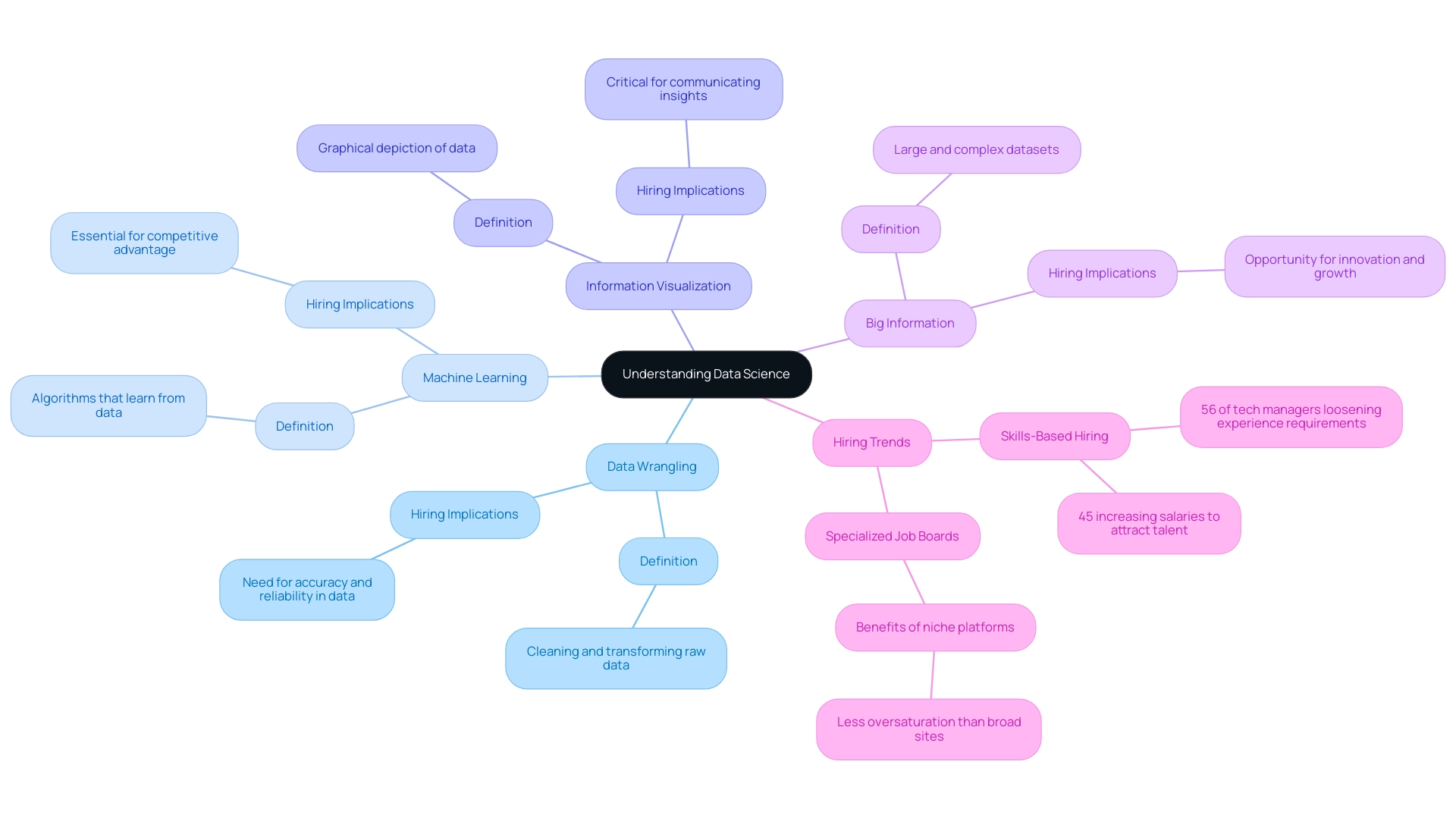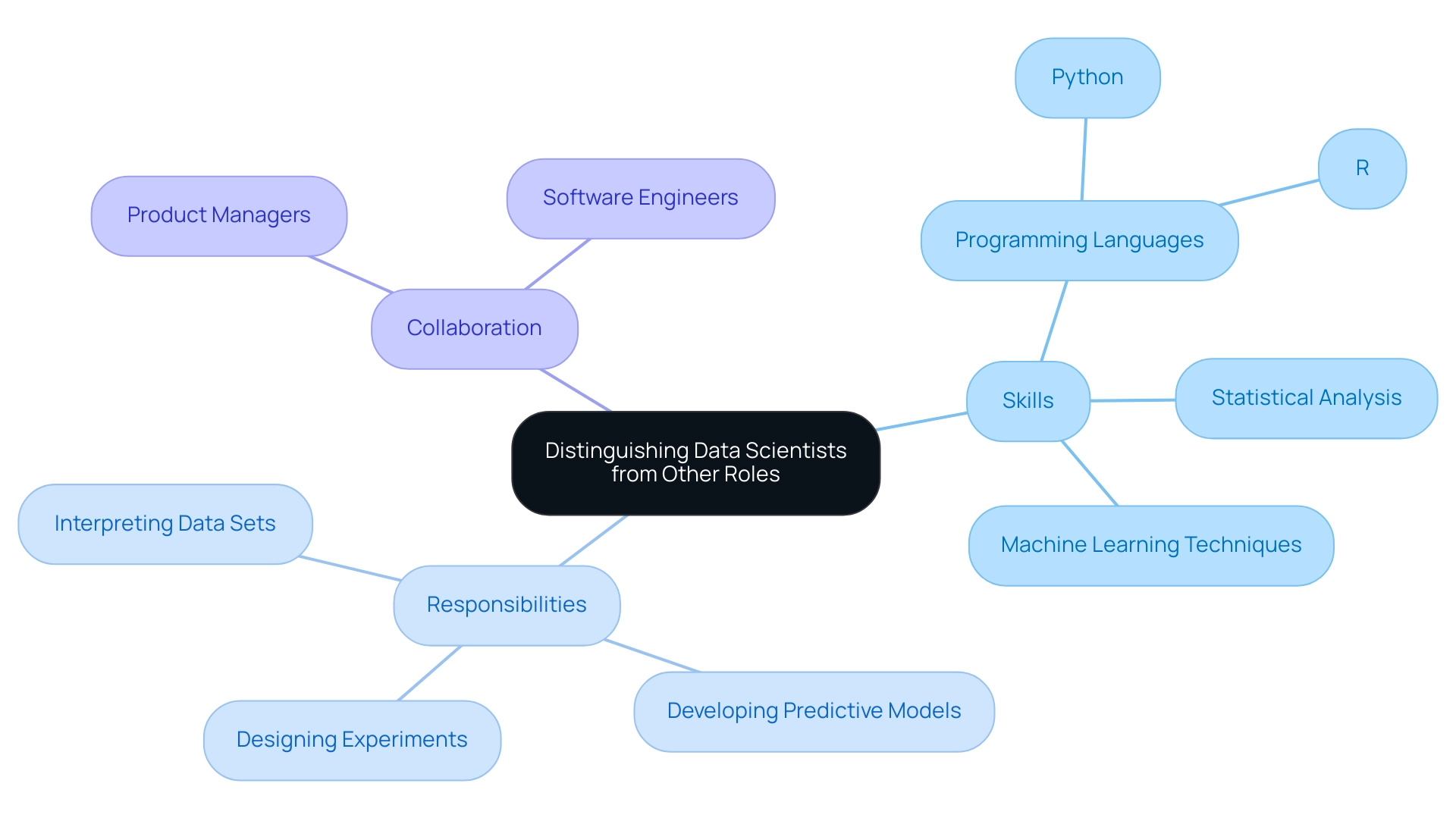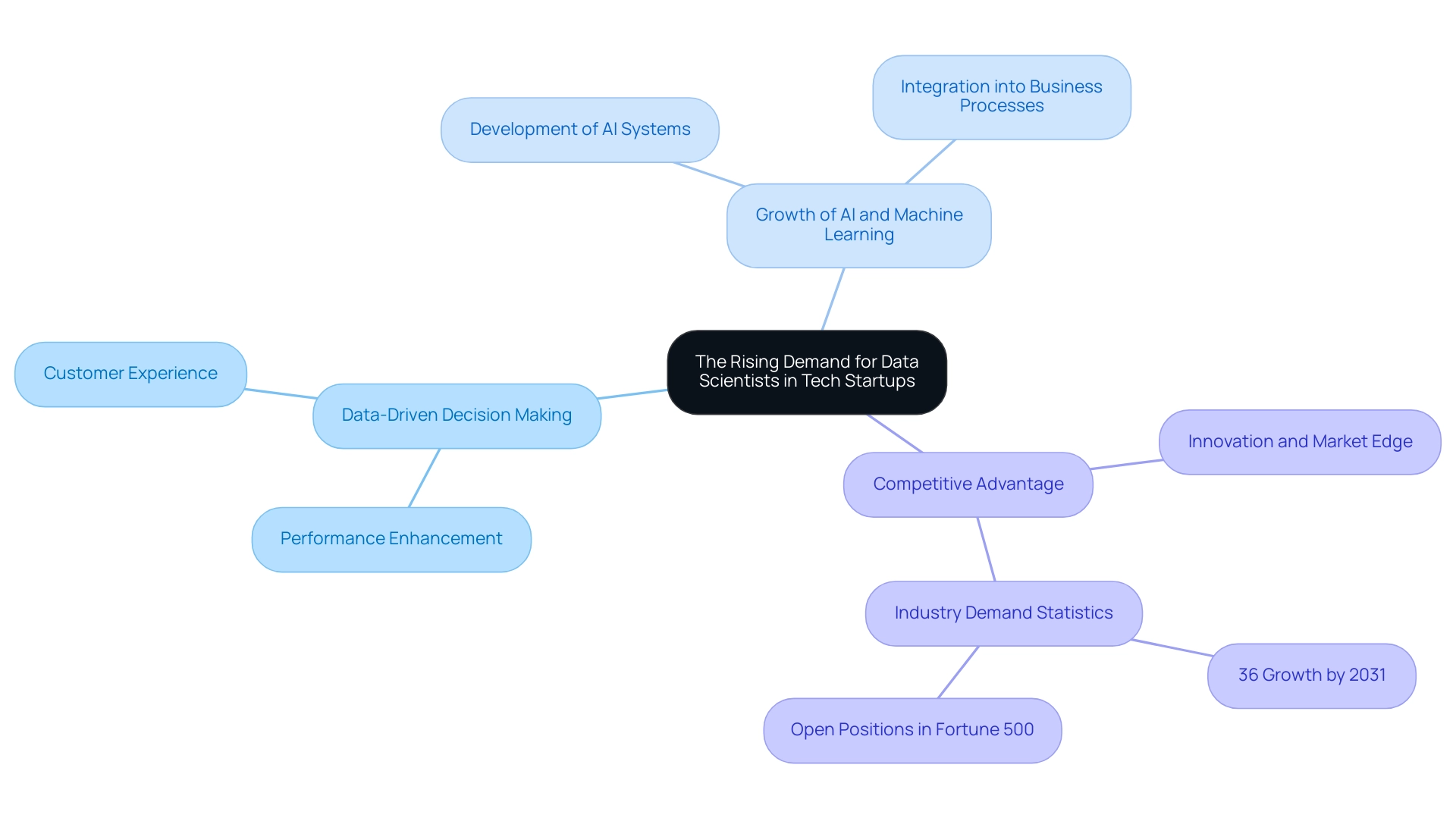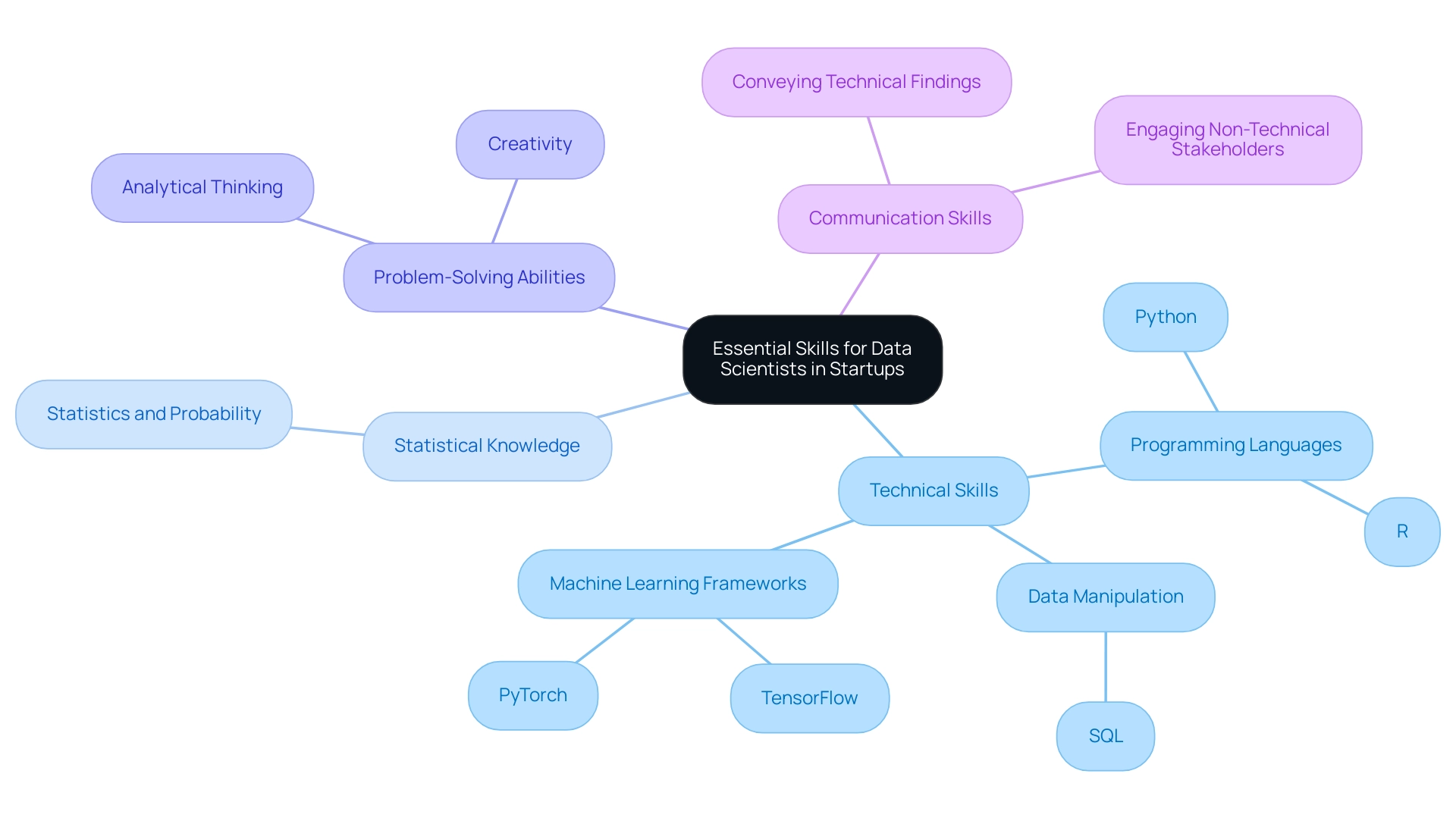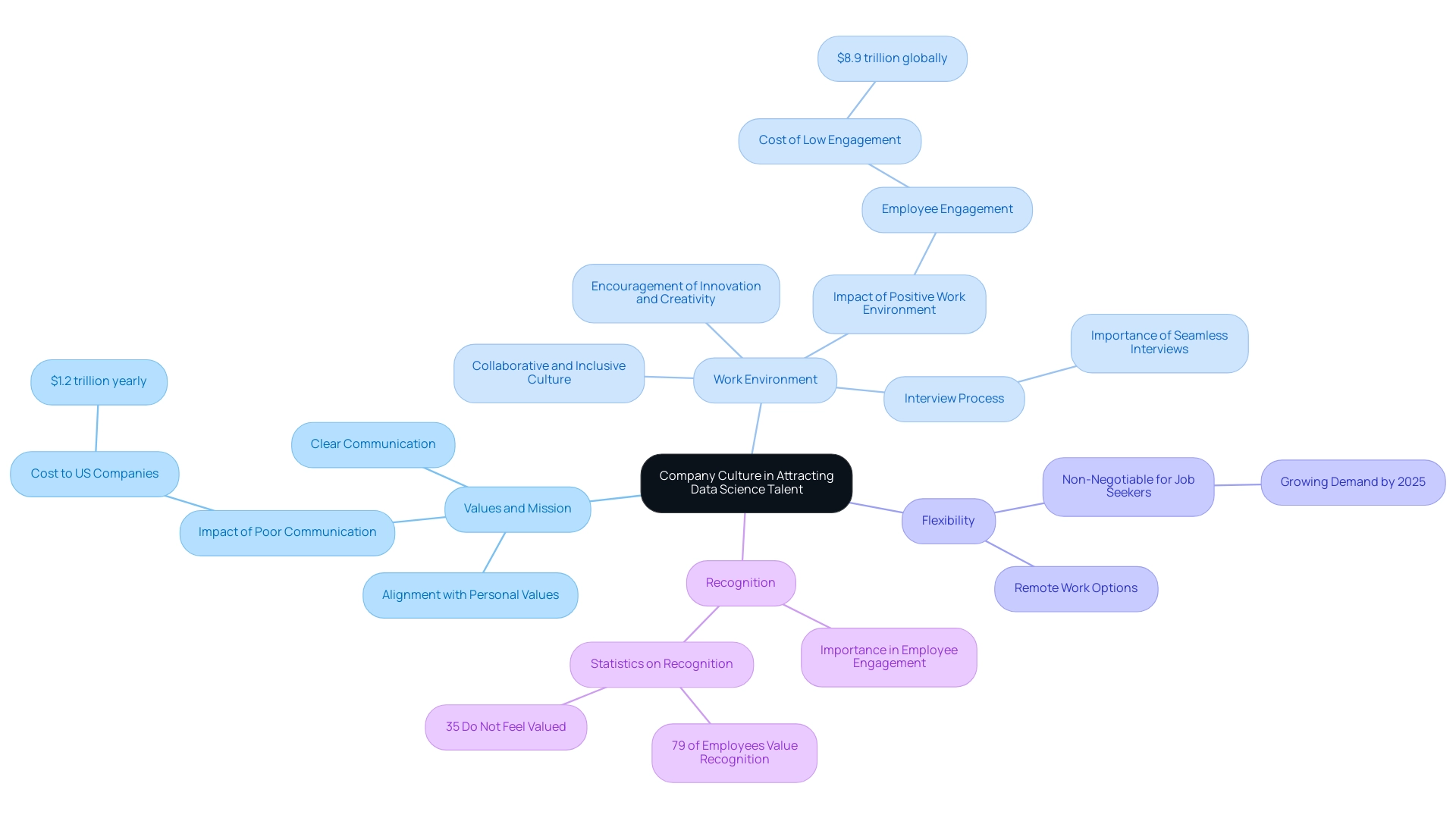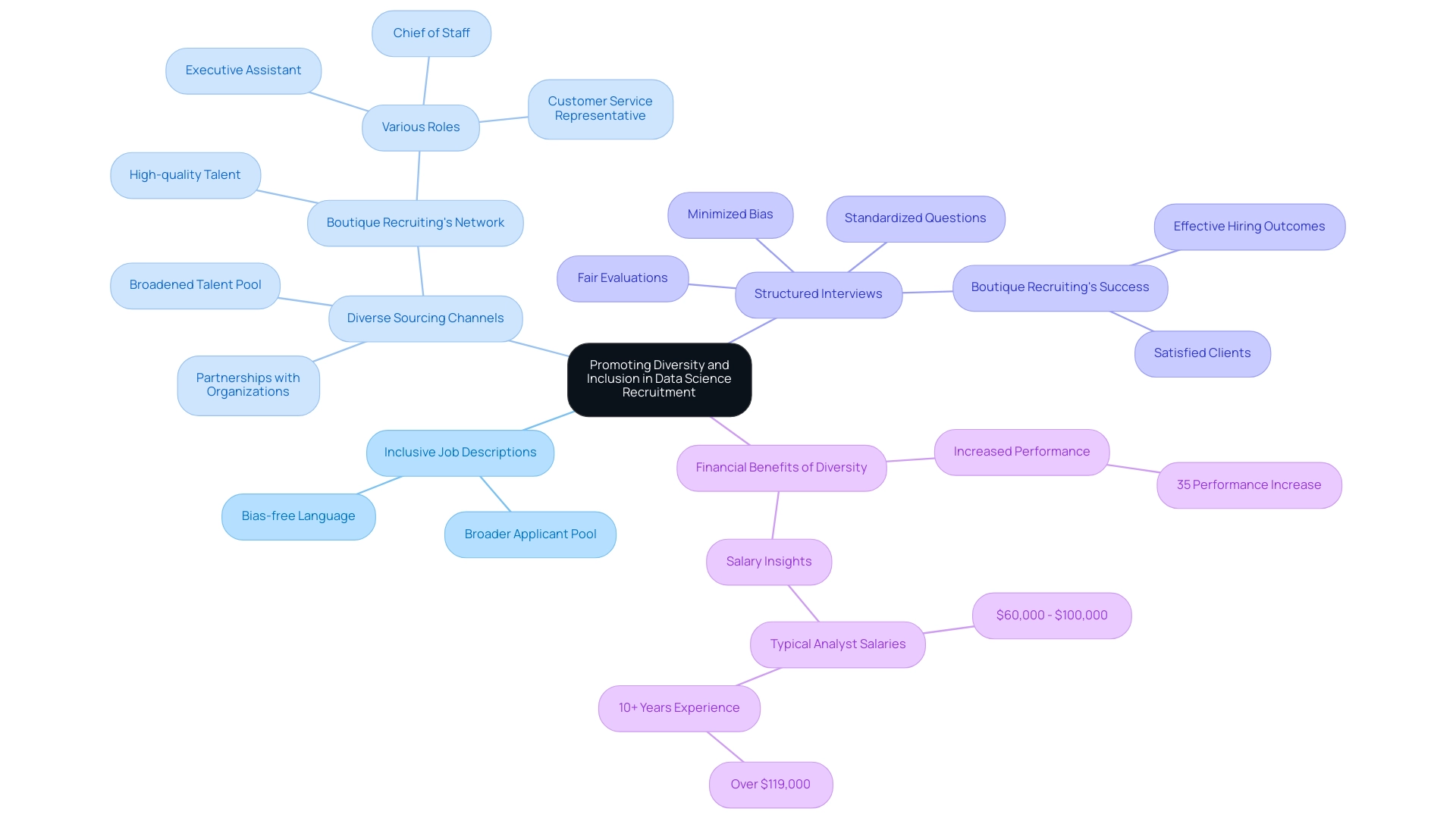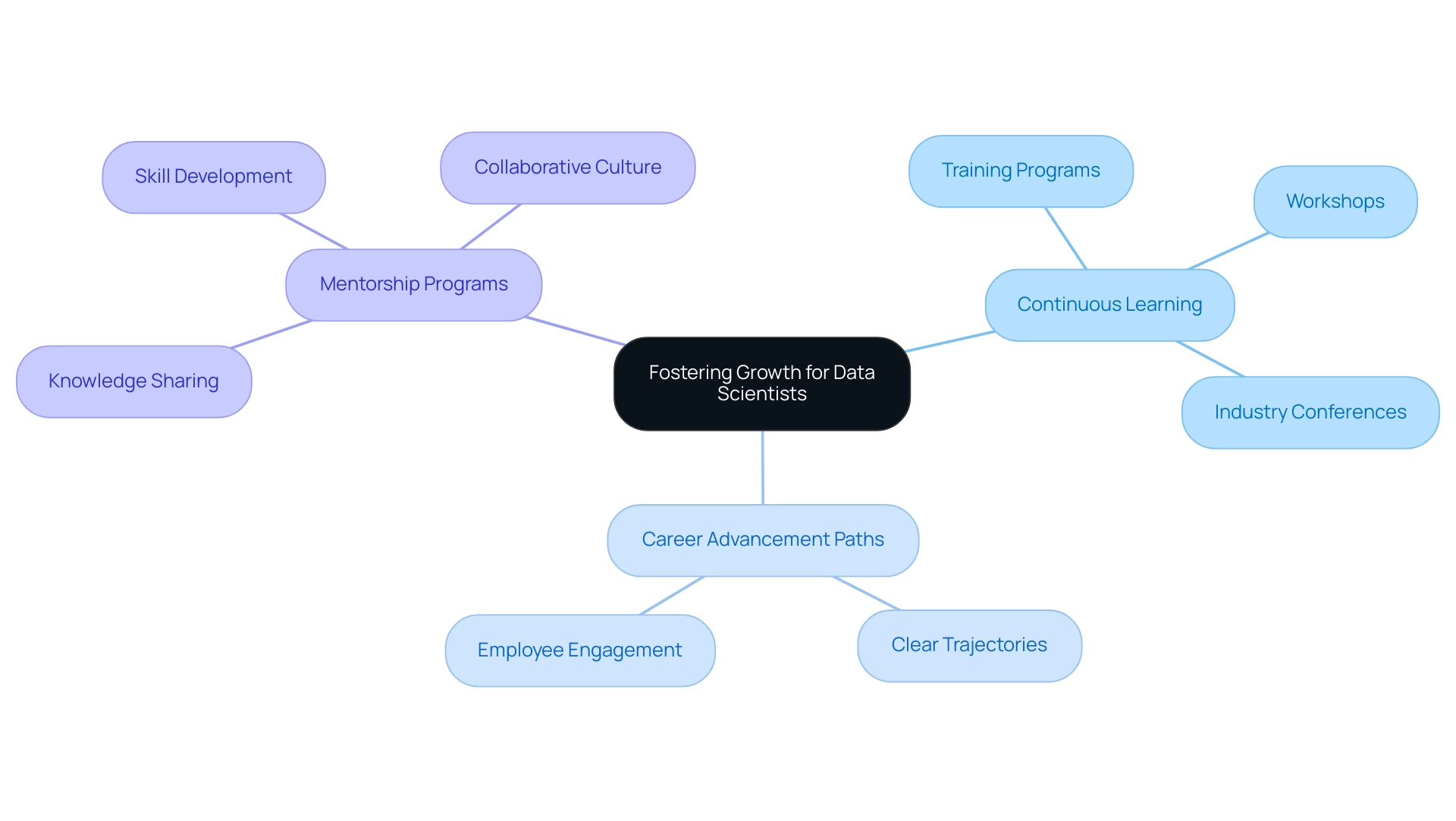Overview
Hiring data scientists for tech startups necessitates a strategic approach that prioritizes essential skills, company culture, and streamlined recruitment processes. It is imperative for tech startups to focus on practical abilities rather than traditional qualifications. Clear job requirements must be defined, and an inclusive culture should be fostered to attract top talent. These elements are vital for effective data-driven decision-making and innovation within a competitive landscape.
Key Highlights:
- Data science combines statistics, computer science, and domain knowledge to extract insights from data.
- Key concepts in data science include data wrangling, machine learning, information visualization, and big data management.
- Tech startups are increasingly prioritizing skills-based hiring, focusing on practical abilities over traditional qualifications.
- The demand for data scientists is driven by the need for data-driven decision making and the growth of AI technologies.
- Essential skills for data scientists include programming (Python, R), statistical knowledge, problem-solving, and communication skills.
- Company culture, including values, work environment, and flexibility, plays a crucial role in attracting data science talent.
- Promoting diversity in hiring involves crafting inclusive job descriptions, utilizing diverse sourcing channels, and implementing structured interviews.
- Streamlining the hiring process requires defining clear job requirements, using technology for applicant tracking, and engaging applicants early.
- Competitive compensation strategies, including market research and performance incentives, are vital for attracting top talent.
- Fostering growth opportunities through continuous learning, defined career paths, and mentorship programs enhances employee retention and satisfaction.
Introduction
In the rapidly evolving landscape of technology, data science stands out as a critical discipline that seamlessly integrates statistics, computer science, and domain expertise to extract meaningful insights from vast amounts of data. As tech startups increasingly recognize the undeniable value of data-driven decision-making, the demand for skilled data scientists is surging.
This article delves into essential concepts and skills defining data science, elucidates the distinct roles and responsibilities of data scientists compared to other data-related positions, and outlines strategies that startups can adopt to attract and retain top talent.
With insights into the hiring landscape, company culture, and the paramount importance of diversity and inclusion, this exploration equips organizations with the knowledge needed to navigate the complexities of building a successful data science team in a competitive market.
Understanding Data Science: Key Concepts and Definitions
Data science is a multifaceted discipline that merges statistics, computer science, and specialized domain knowledge to derive actionable insights from both structured and unstructured information. As the demand for information scientists continues to surge, particularly in tech startups, understanding the foundational concepts of this field is crucial for hiring data scientists in this sector. Key concepts include:
- Data Wrangling: This refers to the meticulous process of cleaning and transforming raw information into a structured format that is ready for analysis. Effective information wrangling is essential, as it ensures that the material used for decision-making is accurate and reliable.
- Machine Learning: A subset of artificial intelligence, machine learning involves algorithms that enable computers to learn from information and make predictions or decisions without explicit programming. This capability is becoming increasingly essential for new businesses that are hiring data scientists to utilize information for competitive advantage.
- Information Visualization: This concept includes the graphical depiction of information and statistics, enabling stakeholders to easily understand complex datasets and communicate insights effectively. In a world flooded with information, strong visualization abilities are essential for translating findings into actionable strategies.
- Big Information: Referring to vast and intricate datasets that traditional processing tools struggle to manage, big information represents both a challenge and an opportunity for tech startups. Organizations that can harness extensive information effectively can uncover trends and insights that drive innovation and growth.
As we look toward 2025, the landscape of analytics is evolving, with a notable shift towards skills-based hiring. Employers are increasingly prioritizing applicants who demonstrate practical abilities and proven outcomes over traditional qualifications. This trend is underscored by the fact that 56% of tech managers are relaxing experience requirements to expedite the hiring process, while 45% are raising salaries to attract top talent.
Notably, the largest employers of data scientists include computer systems design and related services, accounting for 11% of the workforce, highlighting significant employment opportunities in this sector. Moreover, utilizing specialized job boards tailored for data science roles can significantly enhance the recruitment process. Unlike broad platforms that often lead to oversaturation, niche job boards focus on specific skill sets, increasing the likelihood of connecting with qualified candidates. For instance, new businesses that leverage these targeted platforms can streamline their hiring efforts, particularly in hiring data scientists for tech startups, and find individuals who align closely with their project needs.
A case study on leveraging specialized job boards for analytics roles illustrates that while broad job sites like LinkedIn and Indeed have many listings, they are often oversaturated with applicants. Specialized boards, like The SaaS Jobs, emphasize tech and analytics roles, offering a more focused search experience.
As the need for analytics science skills continues to increase, grasping these essential concepts and trends will enable tech companies to make informed decisions regarding hiring data scientists that align with their strategic objectives. Navigating the tech industry in 2025 will demand more than technical expertise; it will require adaptability, continuous learning, and the ability to navigate the evolving landscape of AI, cybersecurity, and digital transformation. With a growing shift toward skills-based hiring, job seekers must highlight their impact and practical abilities.
Similarly, employers should prioritize proven outcomes and demonstrated expertise to make more strategic hiring decisions.
Distinguishing Data Scientists from Other Roles: Skills and Responsibilities
Understanding the distinctions between information professionals, information analysts, and information engineers is crucial for tech startups during the hiring process.
-
Skills: Information professionals possess advanced programming skills, particularly in languages such as Python and R, coupled with a robust foundation in statistical analysis and machine learning techniques. This diverse skill set empowers them to address complex challenges and extract actionable insights. A. Anthony Davis, who recently completed an Advanced Machine Learning course, highlighted the exceptional quality of the learning management system (LMS), underscoring the importance of quality education in this field.
-
Responsibilities: Analysts undertake a variety of responsibilities, including designing experiments, developing predictive models, and interpreting intricate information sets. Their contributions are vital in steering strategic business decisions through data-driven insights. With analytics expertise ranking among the fastest-growing professions, boasting a 37% annual growth rate, the demand for skilled professionals in this domain has never been more pressing.
-
Collaboration: Analysts often collaborate with cross-functional teams, including product managers and software engineers. Such collaboration is essential for startups aiming to hire data scientists who can implement data-driven solutions that align with business objectives and enhance product development. Understanding these distinctions is imperative for startups striving to create precise job descriptions that attract the right talent. By distinctly outlining the unique contributions of information experts in contrast to analysts and engineers, organizations can better align their hiring strategies with the specific needs of their projects and goals. Furthermore, professional courses offered by institutions like University College Dublin allow HR managers to explore options for skill enhancement in analytics and programming, ensuring their teams are well-equipped to navigate the evolving tech landscape.
The Rising Demand for Data Scientists in Tech Startups
In recent years, the demand for hiring data scientists in tech startups has surged significantly. Several key factors are driving this trend:
-
Data-Driven Decision Making: Startups are increasingly leveraging data to inform their strategies and operational decisions. This transition towards information-focused methods enables companies to enhance performance and elevate customer experiences, positioning analytics professionals as essential for converting complex information into actionable insights.
-
Growth of AI and Machine Learning: The rapid advancement of AI and machine learning technologies has created an urgent need for skilled professionals capable of developing, implementing, and refining these systems. As organizations strive to harness the power of AI, the role of analysts becomes crucial in ensuring these technologies are effectively integrated into business processes.
-
Competitive Advantage: Companies that adeptly utilize information can gain a substantial edge over their competitors. According to LinkedIn’s 2022 Emerging Jobs Report, “Demand for information analysts is expected to grow 36% between 2021 and 2031—easily exceeding software engineers.” This statistic underscores the vital role analytics professionals play in fostering innovation and maintaining competitiveness in the tech landscape. Moreover, nearly every Fortune 500 company currently has open scientist positions, reflecting the widespread demand across industries.
Startups must recognize this escalating demand and prioritize their hiring strategies, particularly in recruiting data scientists, to attract qualified candidates for roles such as Chief Technology Officer, Engineer, Solution Architect, and Systems Administrator. Boutique Recruiting, with its custom recruitment solutions tailored to the unique needs of tech and FinTech companies, conducts targeted searches that align with specific company requirements. By focusing on personalized recruitment and seamless interview processes, Boutique Recruiting enhances the ability to make informed hiring decisions based on data-driven insights.
This approach not only improves recruitment efforts but also contributes to the overall success of the organization in a rapidly evolving market. As the landscape continues to change, incorporating analytical science knowledge will be crucial for new ventures aiming to thrive in the competitive tech environment. Are you ready to elevate your hiring strategy? Contact us to learn more.
Essential Skills and Qualifications for Data Scientists in Startups
When hiring data scientists, tech startups must prioritize essential skills and qualifications to attract top talent capable of driving their data initiatives forward.
- Technical Skills: Proficiency in programming languages such as Python and R is crucial, alongside expertise in data manipulation using SQL. Familiarity with machine learning frameworks like TensorFlow and PyTorch is highly regarded, as these tools are essential for developing robust models. Operations Research Analysts utilize statistical and mathematical modeling to enhance business processes, underscoring the significance of these technical skills in scientific roles.
- Statistical Knowledge: A solid foundation in statistics and probability is essential for effective analysis. This knowledge empowers analysts to interpret intricate datasets and derive actionable insights that can guide business strategies.
- Problem-Solving Abilities: The capacity to tackle complex business challenges with analytical thinking and creativity is vital. Data specialists must excel at recognizing patterns and trends within information, enabling them to suggest innovative solutions that propel organizational success.
- Communication Skills: The ability to convey technical findings clearly to non-technical stakeholders is paramount. Effective communication ensures that insights derived from analysis are understood and utilized across the organization, fostering a culture driven by information. As Archana, a writer at GUVI, observes, excelling in a science career demands mastery of a diverse range of skills, from programming and machine learning to problem-solving and communication.
In 2025, the demand for information analysts continues to expand, with statistics showing that positions in this field are among the fastest-growing in technology. Startups that emphasize these qualifications will not only enhance their recruitment efforts for hiring data scientists but also position themselves to leverage analytics effectively in a competitive landscape. By addressing typical obstacles encountered by aspiring analysts, such as skill deficiencies and the necessity for pertinent experience, as emphasized in the case study ‘Common Challenges Faced by Aspiring Analysts,’ new ventures can cultivate a workforce that is both technically proficient and aligned with their organizational culture.
Moreover, grasping organizational culture and specific job specifications is vital, as it enables new businesses to provide individuals who align both technically and culturally within their enterprises.
The Role of Company Culture in Attracting Data Science Talent
Company culture is a crucial element in attracting top data science talent, particularly for tech firms focused on hiring data scientists for tech startups, amid the ongoing competition for talent. To effectively engage potential applicants, startups should focus on several key aspects:
- Values and Mission: Clearly articulating the company’s values and mission is essential. This transparency assists individuals in connecting with the organization and understanding how their personal values align with the company’s objectives. Poor communication can cost US companies an estimated $1.2 trillion yearly, underscoring the need for clear communication of these values. In a competitive talent landscape, individuals are not just evaluating job offers; they are assessing whether the company aligns with their career aspirations and values, seeking the right job with the right company.
- Work Environment: Creating a collaborative and inclusive work environment is crucial. A culture that encourages innovation and creativity not only attracts data scientists but also fosters their growth and satisfaction within the company. Statistics indicate that a positive work environment can significantly enhance employee engagement, which is vital in a competitive job market. In fact, low employee engagement costs the global economy $8.9 trillion, or 9% of global GDP, highlighting the importance of investing in a positive work culture. Furthermore, applicants are keenly observing the interview process for red flags, making it essential for hiring managers to handle interviews seamlessly to avoid losing top talent. It is important to remember that applicants are assessing the company just as much as they are being assessed.
- Flexibility: Offering flexible work arrangements, such as remote work options, can broaden the appeal to a diverse range of individuals. In 2025, flexibility is increasingly becoming a non-negotiable aspect for many job seekers, particularly in the tech sector. This adaptability not only draws applicants but also enables them to explore various opportunities, improving their career achievements.
By emphasizing these aspects, new businesses can foster a positive workplace culture that not only appeals to high-caliber science professionals but also supports hiring data scientists for tech startups, ultimately aiding the organization’s prosperity. The impact of company culture on employee attraction is underscored by recent findings, which show that organizations with strong cultures experience lower turnover rates and higher employee satisfaction. Moreover, case studies show that companies that invest in their culture observe a direct correlation with their capacity to attract and retain top talent, which is crucial for hiring data scientists for tech startups.
For instance, recognition plays a crucial role in employee engagement, with 79% of employees stating that increased recognition would enhance their loyalty, yet 35% do not feel valued or recognized. This gap emphasizes the necessity for new ventures to concentrate on acknowledgment as a component of their cultural strategy, ensuring that they not only draw in but also engage and keep the top talent.
Promoting Diversity and Inclusion in Data Science Recruitment
Promoting diversity and inclusion in data science recruitment is essential for fostering innovation and achieving superior outcomes for startups. Key strategies to enhance diversity in hiring include:
- Inclusive Job Descriptions: Craft job descriptions that utilize language appealing to a diverse audience, steering clear of biased terminology. This approach not only draws a broader spectrum of applicants but also establishes a tone of inclusivity from the outset.
- Diverse Sourcing Channels: Actively seek individuals from various backgrounds by forming partnerships with organizations dedicated to supporting underrepresented groups. This proactive sourcing can significantly broaden the talent pool and enhance the diversity of applicants. Boutique Recruiting excels in this area, leveraging its extensive network to connect with high-quality marketing and operational talent across diverse industries, including roles such as Chief of Staff, Executive Assistant, and Customer Service Representative.
- Structured Interviews: Implement structured interview processes to minimize bias and ensure fair evaluations of all applicants. By standardizing questions and evaluation criteria, companies can create a level playing field that focuses on skills and qualifications rather than subjective judgments. Boutique Recruiting’s impressive track record of success, characterized by numerous satisfied clients and candidates, underscores the effectiveness of such practices in achieving better hiring outcomes.
Research indicates that diverse teams drive innovation, with companies that prioritize diversity experiencing a 35% increase in performance compared to their less diverse counterparts. Furthermore, while salaries for analysts typically range between $60,000 and $100,000, those with over 10 years of experience can earn upwards of $119,000, highlighting the financial benefits of hiring diverse talent. As Sophie Magnet, a copywriter and editor, states, “Anyone can excel in any field given motivation to learn and access to the right information.”
By prioritizing diversity and inclusion, new ventures can strengthen their approach to hiring data scientists for tech startups, building more innovative teams that are better equipped to tackle complex challenges and contribute to the organization’s success. Furthermore, Boutique Recruiting sets itself apart by concentrating on establishing enduring relationships and delivering tailored service throughout the recruitment process, which can result in effective diversity initiatives in hiring and ensure that technical and HR positions are occupied by the most qualified individuals across the U.S. and Canada.
Streamlining the Hiring Process: Strategies for Tech Startups
To effectively streamline the hiring process, tech startups can adopt several key strategies:
- Define Clear Job Requirements: Articulating specific skills and qualifications is crucial for attracting the right candidates. This clarity not only assists in filtering applicants but also prepares the ground for individuals to comprehend the expectations of the role. Research suggests that startups with clearly outlined job descriptions experience a 30% improvement in applicant quality, making this step essential. Boutique Recruiting’s meticulous approach to understanding company culture and job requirements further underscores the importance of cultural fit in the recruitment process, ensuring that applicants align with the organization’s values and goals. We specialize in roles such as Chief Technology Officer, Engineer, and other technical and HR positions, tailoring our searches to meet unique company needs.
- Utilize Technology: Implementing advanced applicant tracking systems (ATS) and recruitment software can significantly enhance the management of applications. With recruiters now handling over 2,500 applications—2.7 times more than three years ago—technology becomes indispensable in organizing and streamlining the recruitment workflow. These tools can automate repetitive tasks, allowing recruiters to concentrate on engaging with top prospects. As Kurt Vosburgh aptly states, “The war for talent means treating applicants like VIP customers, not just another submission in the pile.”
- Engage Applicants Early: Maintaining open lines of communication with applicants throughout the hiring process is vital. Timely notifying applicants about their application status and next steps fosters a sense of involvement and maintains their interest. This proactive method can result in a 50% decrease in applicant drop-off rates, as individuals feel valued and informed. Furthermore, embracing transparency during interviews—encouraging candidates to share their workstyle preferences, salary expectations, and personal insights—can build trust and enhance the overall candidate experience. As organizations progressively participate in global recruitment to tackle talent shortages, tech companies should contemplate expanding their search to attract exceptional analytics talent from varied backgrounds.
By optimizing these aspects of their recruitment processes, technology companies can significantly enhance their ability to attract and secure top-tier analytics professionals. This capability is crucial for hiring data scientists for tech startups and ultimately driving innovation and growth within their organizations. For more information on how Boutique Recruiting can assist with your recruitment needs, please contact us.
Offering Competitive Compensation: Attracting Top Data Science Talent
To effectively attract top data science talent in the current war for talent, startups must implement strategic compensation approaches:
- Market Research: Conduct thorough research to grasp the current salary trends for data scientists within the tech industry. As of 2025, analysts earn between $65,000 and $140,000, with entry-level positions starting lower and mid- to senior-level professionals commanding significantly higher salaries. Understanding these trends is crucial for setting competitive salary offers, especially in light of the ongoing tech talent shortage, as highlighted in the “Motion’s IT Salary Guide Overview.”
- Comprehensive Benefits: Providing a robust benefits package is essential. This should encompass health insurance, retirement plans, and opportunities for professional development. In 2025, the importance of benefits packages in attracting tech talent cannot be overstated, as candidates increasingly prioritize comprehensive offerings that support their well-being and career growth. For example, in Munich, an information analyst can anticipate a median base salary of $73,497 annually, with an average supplementary compensation of $5,444, resulting in an average income of $78,941.
- Performance Incentives: Implementing performance-based bonuses or stock options can serve as powerful motivators for high-performing employees. Such incentives not only reward individual contributions but also align employee goals with the company’s success, fostering a culture of excellence. Notably, the top-paying company for information scientists is Meta, offering an impressive salary of $251,997, which sets a benchmark for competitive compensation strategies.
In the current war for talent, it is crucial for hiring managers to handle the interview process seamlessly. Candidates are not just evaluating the job; they are also assessing the company and its culture. They are on the lookout for red flags during interviews, making it imperative that your organization presents itself as an attractive option.
Boutique Recruiting employs tailored strategies to ensure that applicants perceive the company positively, enhancing the overall experience for them. By implementing these competitive compensation strategies and facilitating a smooth interview process, new companies can significantly increase their attractiveness to prospective applicants. This is crucial when it comes to hiring data scientists for tech startups, ensuring they draw in and keep the top science talent in a competitive market. As Eric Eddy observed, Boutique Recruiting’s capability to provide exceptional individuals swiftly and effectively underscores the significance of these strategies in the hiring process.
Fostering Growth and Development Opportunities for Data Scientists
To effectively foster growth and development opportunities for analytics professionals, tech startups must implement several strategic initiatives:
- Encourage Continuous Learning: Startups should prioritize access to training programs, workshops, and industry conferences. This commitment not only keeps professionals informed of the latest trends but also aligns with the growing demand for organizations that provide ongoing learning and career advancement opportunities, particularly observed among applicants in Latin America. As Eric Eddy emphasizes, the firm’s ability to deliver top-notch candidates quickly and efficiently is closely tied to how well organizations invest in their employees’ growth.
- Define Career Advancement Paths: Clearly outlining potential career trajectories within the organization is crucial. This transparency motivates employees to envision their future with the company, enhancing their engagement and commitment to personal growth.
- Establish Mentorship Programs: Implementing mentorship initiatives that connect seasoned data scientists with newer team members can significantly enhance knowledge sharing. Such programs not only facilitate skill development but also foster a collaborative culture that is essential for innovation.
Investing in these growth strategies not only improves retention rates but also cultivates a more skilled and adaptable workforce. In fact, a recent study highlighted that 39% of small businesses utilize classroom-led training, while 17% have adopted virtual classrooms, showcasing the diverse approaches to employee training and the need for flexibility in learning methods. Furthermore, leaders should model a commitment to learning by integrating it into organizational goals, thereby fostering a culture that values continuous improvement. By embracing continuous learning and structured development opportunities, startups can enhance their appeal as attractive employers for hiring data scientists in the competitive tech landscape.
Conclusion
The landscape of data science is evolving at an unprecedented pace, necessitating that tech startups adapt to remain competitive. By grasping the fundamental concepts and skills that characterize data science, startups can make informed hiring decisions that align with their strategic objectives. Recognizing the distinct roles and responsibilities of data scientists in contrast to data analysts and engineers is crucial for crafting precise job descriptions that attract the right talent.
As the demand for data scientists continues to escalate—driven by the imperative for data-driven decision-making and advancements in AI and machine learning—startups must prioritize their hiring strategies. Emphasizing essential skills, fostering a positive company culture, and promoting diversity and inclusion are critical components that enhance recruitment efforts. Additionally, offering competitive compensation packages and clear growth opportunities can significantly bolster a startup’s appeal to top data science candidates.
Navigating the complexities of building a successful data science team requires a multifaceted approach. By focusing on the right strategies, how can startups attract and retain skilled data scientists who will drive innovation and contribute to their long-term success in an ever-evolving tech landscape? The integration of data science expertise is not merely an asset; it is a necessity for thriving amidst the competitive pressures of the industry. Startups must act decisively to ensure they are equipped with the talent needed to succeed.
Frequently Asked Questions
What is data science?
Data science is a multifaceted discipline that combines statistics, computer science, and specialized domain knowledge to extract actionable insights from both structured and unstructured data.
What are the key concepts in data science?
Key concepts in data science include Data Wrangling, Machine Learning, Information Visualization, and Big Data. Each of these areas plays a crucial role in analyzing and interpreting data effectively.
What is Data Wrangling?
Data Wrangling is the process of cleaning and transforming raw data into a structured format suitable for analysis, ensuring the accuracy and reliability of the information used for decision-making.
How does Machine Learning fit into data science?
Machine Learning is a subset of artificial intelligence that utilizes algorithms to allow computers to learn from data and make predictions or decisions without being explicitly programmed, which is increasingly important for tech startups.
What is Information Visualization?
Information Visualization involves the graphical representation of data and statistics, making complex datasets easier to understand and communicate insights effectively.
What does Big Data refer to?
Big Data refers to large and complex datasets that traditional processing tools struggle to manage. It presents both challenges and opportunities for tech startups to uncover trends and insights.
How is the hiring landscape changing for data scientists?
As we approach 2025, there is a shift towards skills-based hiring, with employers prioritizing practical abilities and proven outcomes over traditional qualifications. Many tech managers are relaxing experience requirements and increasing salaries to attract top talent.
What industries are hiring data scientists?
The largest employers of data scientists are in computer systems design and related services, which account for 11% of the workforce, indicating significant employment opportunities in this sector.
How can specialized job boards help in hiring data scientists?
Specialized job boards focus on specific skill sets, making it easier for startups to connect with qualified candidates for data science roles, as opposed to broad platforms that may be oversaturated with applicants.
What skills are essential for information professionals?
Information professionals should have advanced programming skills, particularly in languages like Python and R, along with a strong foundation in statistical analysis and machine learning techniques.
What are the responsibilities of data analysts?
Data analysts are responsible for designing experiments, developing predictive models, and interpreting complex information sets to guide strategic business decisions through data-driven insights.
Why is collaboration important for data analysts?
Collaboration with cross-functional teams, such as product managers and software engineers, is essential for implementing data-driven solutions that align with business objectives and enhance product development.
What factors are driving the demand for data scientists in tech startups?
Key factors include the need for data-driven decision making, the growth of AI and machine learning technologies, and the competitive advantage gained from effectively utilizing data.
What is the expected growth rate for information analysts?
The demand for information analysts is expected to grow by 36% between 2021 and 2031, surpassing the growth rate of software engineers, highlighting the critical role of analytics professionals in the tech landscape.
